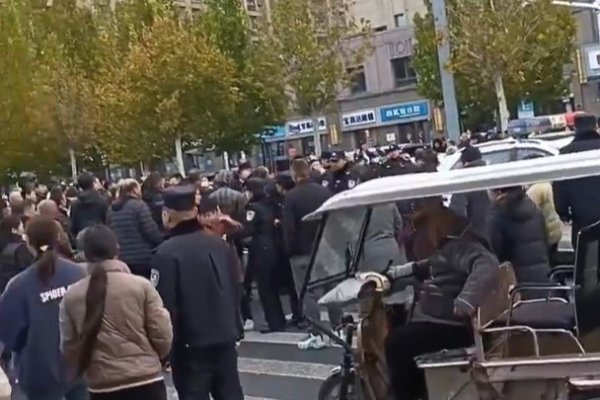On November 25, hundreds of villagers from Gongzhai Village in Xincheng Street Office, Huiji District, Zhengzhou City, Henan Province, gathered at the district government to protest against the compensation for relocation being given in the form of housing vouchers instead of cash, demanding cash compensation.
The villager Fang Yong (pseudonym) told reporters that at around 9 a.m. on the 25th, more than 200 villagers first went to the village committee, and later to the district government, where local authorities sent out special police to disperse the villagers, leading to physical confrontations. Eventually, staff from the petition office came out to negotiate with the villagers in the village, but no concrete outcome was reached.
The focus of this protest by Gongzhai Village residents lies in the relocation settlement involving the use of “housing vouchers” instead of cash. This is a shantytown redevelopment policy implemented in Zhengzhou, where the original homeowners who are being relocated (mostly village residents within the city) receive “vouchers” that can be used to purchase commercial housing based on the assessed value of their original property.
According to reports, Zhengzhou City had introduced a similar “housing voucher” policy back in 2022 but did not fully implement it at that time. The local government reintroduced the policy this year, aiming to “purchase by replacement,” with the dual goals of quickly resolving the relocation and settlement issues for the villagers and gradually revitalizing the real estate market in Zhengzhou by resolving existing stock. However, this policy has faced public backlash.
Fang Yong stated, “Everyone is dissatisfied, but only we, the people of Gongzhai Village, dared to speak out. We went directly to the district committee’s doorstep to protest.”
Gongzhai Village was designated for demolition under the guise of urban village renovation in 2013, with promises of compensation and resettlement based on a standard of 90 square meters per person. For instance, a family of five could receive a total area of 450 square meters in a house, and the transitional resettlement fee was over 800 yuan per person per month (RMB, the same below), but no payments have been made in the past three years.
Using his own family as an example, Fang Yong explained to reporters the irrationality of the current housing voucher policy. His family of four was initially allocated a 360-square-meter house, but they were given a 140-square-meter unit, with the remaining 220 square meters compensated in the form of electronic housing vouchers priced at 6,300 yuan per square meter. He pointed out that the average property price in Zhengzhou is now over 10,000 yuan per square meter, with properties developed by Rongchuang Group in the village even priced at 17,000 yuan per square meter. Fang Yong expressed his inability to afford the 990,000 yuan price difference to buy a house within the village due to the current economic conditions.
Fang Yong mentioned that as a renovation contractor, he still has over 800,000 yuan in outstanding payments, but the market conditions have made it extremely challenging to earn money, making it impossible to borrow money to pay the 990,000 yuan difference. He emphasized the need for the remaining 220 square meters to be compensated in cash so that individuals can decide whether to purchase a property on their own.
With a population of over six thousand, each household in the village has received a house, but most of those hoping to purchase real estate are young people seeking housing near good schools in Zhengzhou. However, they are reluctant to bear the price difference individually. Older residents prefer cash settlements as they find it difficult to rent out additional properties.
Residents believe that the government’s resettlement policy is akin to “robbery,” leading to a loss of trust in the government, stating that, “The economic situation is particularly bad, but the government cannot oppress the people in this manner.” Cut off from the economic prosperity, residents are struggling with rising property prices and stagnating rental demand in Zhengzhou, further worsening their financial burdens.

